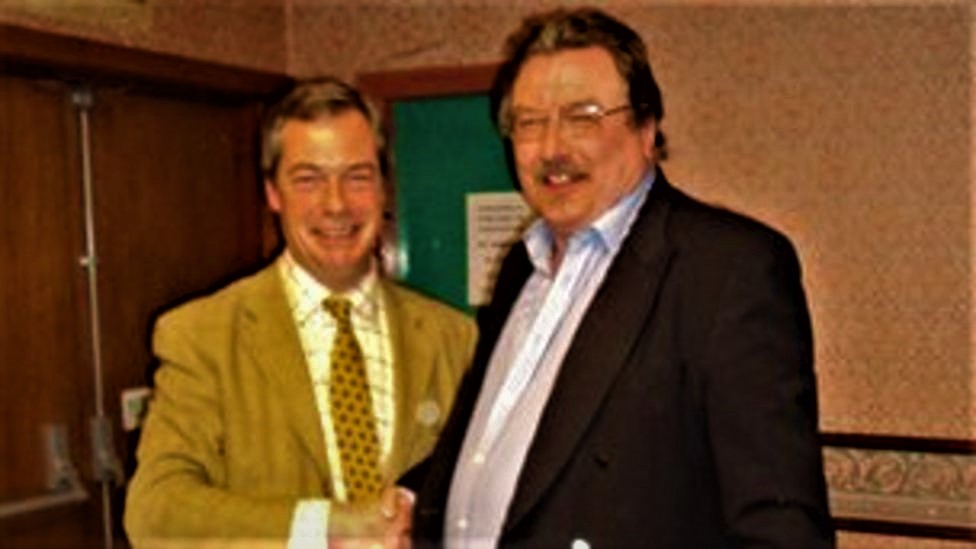
One Party After Another: The Disruptive Life of Nigel Farage
Michael Crick, Simon & Schuster, 2022, 606 pages, £25
KEN BELL reflects on the career of Brexit’s cheeky chappie
Many of the people involved in the Brexit debate will merit footnotes in the histories of the period that have yet to be written. Nigel Farage, on the other hand, will have whole volumes dedicated to him, and Michael Crick’s biographymarks a worthy first contribution to the many that will arrive down the decades to come.
Farage is without doubt the most successful politician of our times. He did more than virtually anyone else to get the United Kingdom out of the European Union, and so has succeeded in all his political aims. He is also the luckiest. How much his success owes to pure chance is something for future historians to debate, but reading Crick’s work it is hard to argue with the notion that Farage was incredibly lucky with the opponents that he was given.
UKIP, the party he came to dominate, was founded in 1993 and would have probably remained a fringe outfit that would have been lucky if it had ever won a clutch of council seats. But then Tony Blair and Paddy Ashdown came together, to provide the party, and Farage, with their first big break.
Prior to the 1997 general election, both Blair and Ashdown had discussed ‘The Project’, a plan to combine Blair’s Labour with Ashdown’s Liberal Democrats. But once Blair won his massive majority in 1997, he reneged on most of that, which left his erstwhile partner desperate to avoid being left completely out in the cold. Crick notes, ‘Ashdown fought to ensure that as a kind of consolation prize he at least got Blair to stick to his public pledge of PR [proportional representation] for the European elections of 1999.’ Blair tossed him that particular bone, but this also meant that minor parties now had a chance to gain seats.
UKIP took three seats in 1999, and came close in a clutch of others. It must be chastening for a Liberal Democrat to realise that had that election not been fought with PR, then the party would not have won any seats, and would probably have contented itself with another one of its internal rows that activists loved and real people hated. UKIP could quite possibly have split into its various factions, and the whole EU debate would have been held back for another generation.
One of the newly minted MEPs was Nigel Farage and given that UKIP had now gone from being a fringe outfit to a serious political party, invitations to appear on television came thick and fast. Farage could be relied upon to get his party’s supporters cheering at the TV, and at the same time enrage his party’s opponents. It made for perfect television, so Farage became almost overnight the household name he remains today. Again, luck played its part as the ‘Cavalier’ Farage was surrounded in UKIP by some pretty gruesome ‘Roundheads’ whom nobody sane would want anywhere near a television studio, representing the party or anything else.
Farage’s womanising activities are awarded a chapter all to themselves, which they deserve as Farage is an enthusiastic swordsman. However, I was struck with just how disapproving his ‘Kipper’ colleagues were with his women, and his carousing in general. Farage clearly enjoyed himself hugely in Brussels and that left his opponents looking even more gammon-like than usual. As he left to take up his seat in Brussels, a journalist asked if he was worried that he might become corrupted by the ‘lunches, dinners, champagne receptions’ and the like, to which Farage replied: ‘No, I’ve always lived like that.’
Anyone who has met Farage will recognise at once that he is very introverted. I met him once in 2013 after he had raised the roof at a rally. I asked him to agree to have his photo taken with me and he quite grumpily replied, ‘Yes, alright,’ before taking my hand and going into full grin-mode for the camera. As soon as it was over he scampered off before anyone else he didn’t know could talk to him. As an introvert myself, I knew immediately how difficult it must be for Farage to interact with strangers in any un-staged environment.

Fast forward to 2019. In the run-up to the European elections, Farage came to address a monster rally in Edinburgh. I was one of the activists who were told to hang around after the event to go backstage and meet Farage. The idea was a bit of ego-stroking for us from the leader, with a few photos to show to our friends and handshakes all round. Instead, Farage left as soon as he walked off stage, which left a group of about a dozen people feeling very miffed indeed. Politicians know that a short pep talk to their senior activists is a big ingredient of any campaign dish. The politician tells the activists how important they are, mentions a few by name, before having the photos taken and then scampering off to the next campaign stop.
Farage broke that rule as he broke so many other rules of the political game. He got away with it partly because of his incredible luck, but also because for us it was always about campaigning to get Britain out of the EU, and nothing more. Nigel Farage, with his beer, his cigarettes, his women and cheeky grin, was the symbol of that but never its organiser.
KEN BELL is a Mancunian who fetched up in Mexico, and who now lives in shabby retirement in Edinburgh. He writes as a hobby in his twilight years; a fuller biography can be found at his Amazon author page
